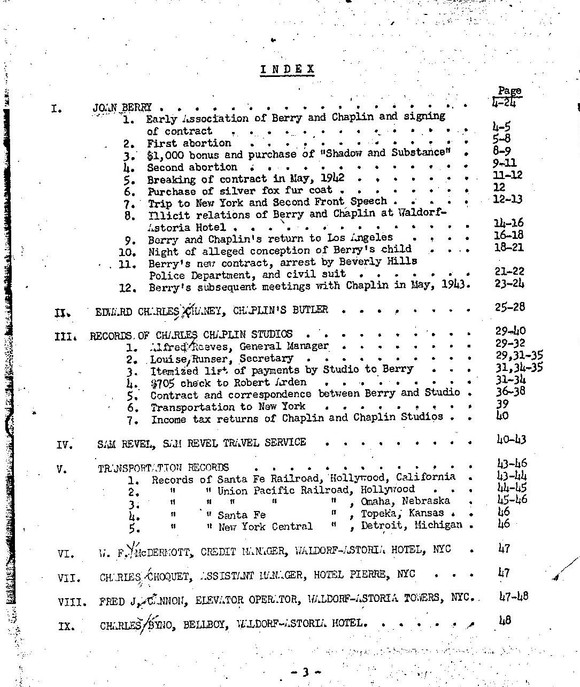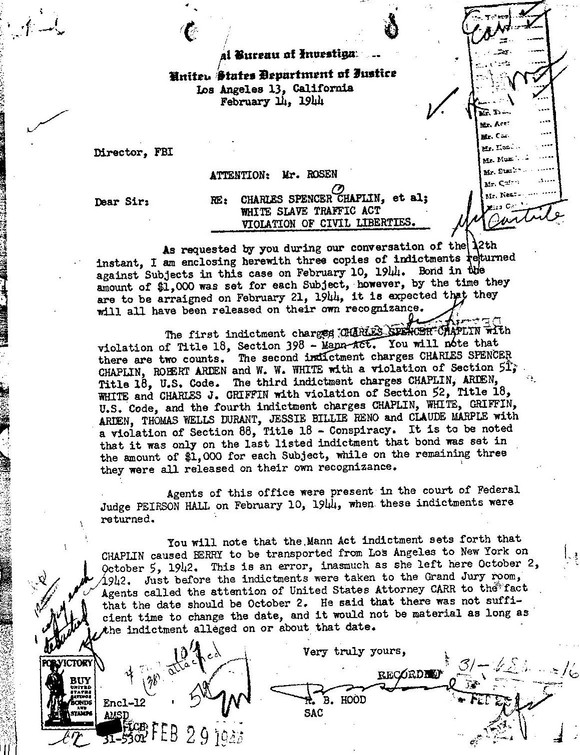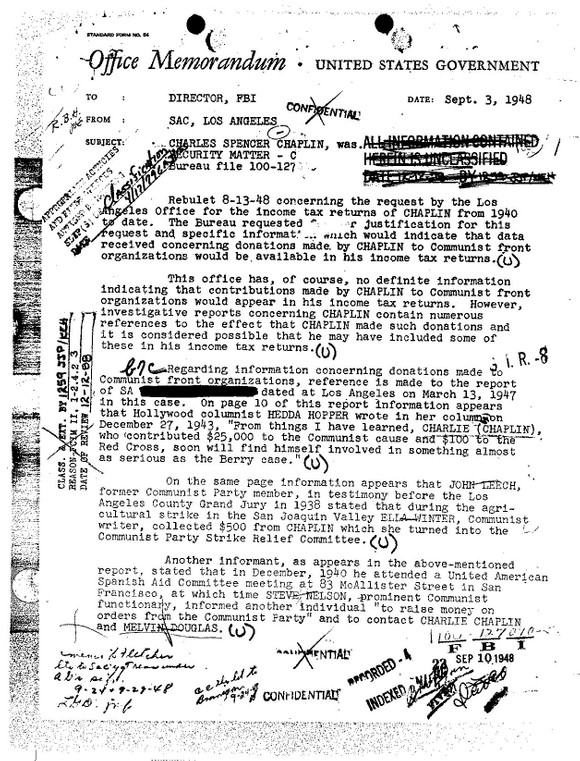Starting from:
$12.95
Charlie Chaplin FBI British MI5 & Foreign and Commonwealth Office Files
Charlie Chaplin FBI, British MI5 & Foreign and Commonwealth Office Files
3,071 pages of FBI, British MI5 intelligence and Foreign Office files, and court documents related to Charlie Chaplin.
Charles Spencer Chaplin (16 April 1889 – 25 December 1977) was born in London. He came to America and became the most successful silent film era comedian. In 1919, he co-founded United Artists with Douglas Fairbanks, Mary Pickford, and D.W. Griffith. Having never become a United States citizen, he was barred from the United States in 1952 due to suspicions about his political beliefs. Chaplin was allowed a visa to return to the United States briefly, allowing him to be able to accept his Honorary Oscar at the 44th Annual Academy Awards in 1972. Chaplin died in exile in Switzerland in 1977. After his death, Chaplin's body was stolen from its grave and held for ransom. His remains were recovered from a cornfield near the cemetery in Vevey Switzerland.
FBI Files
2,060 pages of files, dating from 1922 to 1978 copied from FBI Headquarters in Washington, D.C., covering Charlie Chaplin.
Files include memos, reports, investigation summaries, a transcript of an interview conducted by INS officials concerning his political views, and newspaper clippings. The files cover the FBI's concerns and investigations into Chaplin's political views and personal life. Chaplin first came to the attention of the FBI in the early 1920's, due to his left of center political views. Then Assistant to the Director of the FBI, J. Edgar Hoover, wrote in a memo that Chaplin was one of Hollywood's "parlor Bolsheviki." Chaplin came under increased review after his 1936 film "Modern Times" and his 1941 "The Great Dictator."
Much attention is given to the Joan Barry case. After the actress Joan Barry filled a paternity case in a California court against Chaplin in 1943, an investigation lead to Chaplin being charged with "white slavery," and violating the civil rights of Barry. Chaplin was charged with violating the 1910 Mann Act, also called the White Slave Traffic Act. This federal law prohibited people from transporting women across state lines for "immoral purposes." Originally intended to be a law against prostitution, at times its enforcement was expanded to include any activity considered immoral. Chaplin was acquitted of the charges brought against him in the first two indictments to go to trial and later, the other charges were dropped.
A blood test showed that it was impossible for Chaplin to be the father of Barry's child. However, at the time blood type evidence was not admissible in California courts. The first paternity trial ended in a mistrial. A second trial found Chaplin guilty and he was ordered to pay support until the child's 18th birthday.
After leaving the United States in 1952 to attend the London premiere of his film "Limelight," Chaplin's re-entry visa was revoked, and he was barred from reentering the United States as a security risk. Documents show the bureau's efforts to compile information that would keep him out of the United States. Chaplin decided not to fight the decision and moved to Switzerland. He returned to the United States only once, in 1972, to accept a special Oscar, presented to him at the Academy Awards. According to a 1952 FBI memo, there was no evidence that could be presented that would bar his re-entry into the United States. When informants who had made allegations against Chaplin were asked to testify under oath, all refused.
MI5 Files
121 pages of MI5 files covering Chaplin dating from September 22, 1952 to December 20, 1960.
The British intelligence agency opened a file on Chaplin in 1952, when he was reported to have made a covert donation to the American Communist Party in 1923 and to have continued to have communist associations. The FBI, which described the star of Modern Times and The Great Dictator as one of "Hollywood's parlor Bolsheviks", asked the MI5 for information to help get him banned from the U.S. The MI5 gathered information through techniques including eavesdropping.
In 1953, he denied that he was a communist, but was prevented from returning to the USA. In 1958 the MI5 Security Service, which had never been convinced by the American reports, assessed him as progressive or radical rather than communist. The material includes a greetings telegram to Chaplin from the Soviet agent Ivor Montague.
When investigating his origins at the request of the FBI, British officers could not find a birth certificate for Chaplin and the earliest official record was a passport issued in 1920. They investigated suggestions he was born in Fontainebleau, near Paris, or nearby Melun, while the FBI claimed his real name was Israel Thornstein and raised the idea, he may have been a Russian Jew. The MI5, despite extensive searches, could find no evidence of any of the claims leaving his true origins a mystery.
David Robinson, the author of "Chaplin: His Life and Art," wrote that it is not surprising that his parents failed to register the birth. According to Robinson, "It was easy enough, particularly for music hall artists, constantly moving (if they were lucky) from one town to another, to put off and eventually forget this kind of formality; at that time the penalties were not strict or efficiently enforced."
The MI5 noted that a decade earlier Chaplin had told the Los Angeles branch of the National Council of American Soviet Friendship: "There is a great deal of good in communism. We can use the good and segregate the bad."
"We have no trace in our records of this man, nor are we satisfied that there are any reliable grounds for regarding him as a security risk," Sir Percy Sillitoe, then head of MI5, told the chief police commissioner in South Africa, where Chaplin was planning a visit.
Foreign and Commonwealth Office Files
A 22-page file on honours recommendations give views on possible Knighthood for actor Charlie Chaplin. The files show that the British Government blocked Chaplin's knighthood for nearly 20 years because of US concern about his muddled private life and leftist political affiliations. He was eventually knighted in March 1975.
Film Sonores Tobis, Societe Anonyme v. Charles Chaplin, Charles Chaplin Film Corporation, and United Artists Corporation Court Documents
862 pages of court documents. The complaint in this case alleges that Charlie Chaplin, Charles Chaplin Film Corporation, and United Artists, by producing and distributing the film "Modern Times", engaged in unfair competition and infringed on the rights of Film Sonores Tobis which had produced the film "A Nous la Liberte" in 1931.





3,071 pages of FBI, British MI5 intelligence and Foreign Office files, and court documents related to Charlie Chaplin.
Charles Spencer Chaplin (16 April 1889 – 25 December 1977) was born in London. He came to America and became the most successful silent film era comedian. In 1919, he co-founded United Artists with Douglas Fairbanks, Mary Pickford, and D.W. Griffith. Having never become a United States citizen, he was barred from the United States in 1952 due to suspicions about his political beliefs. Chaplin was allowed a visa to return to the United States briefly, allowing him to be able to accept his Honorary Oscar at the 44th Annual Academy Awards in 1972. Chaplin died in exile in Switzerland in 1977. After his death, Chaplin's body was stolen from its grave and held for ransom. His remains were recovered from a cornfield near the cemetery in Vevey Switzerland.
FBI Files
2,060 pages of files, dating from 1922 to 1978 copied from FBI Headquarters in Washington, D.C., covering Charlie Chaplin.
Files include memos, reports, investigation summaries, a transcript of an interview conducted by INS officials concerning his political views, and newspaper clippings. The files cover the FBI's concerns and investigations into Chaplin's political views and personal life. Chaplin first came to the attention of the FBI in the early 1920's, due to his left of center political views. Then Assistant to the Director of the FBI, J. Edgar Hoover, wrote in a memo that Chaplin was one of Hollywood's "parlor Bolsheviki." Chaplin came under increased review after his 1936 film "Modern Times" and his 1941 "The Great Dictator."
Much attention is given to the Joan Barry case. After the actress Joan Barry filled a paternity case in a California court against Chaplin in 1943, an investigation lead to Chaplin being charged with "white slavery," and violating the civil rights of Barry. Chaplin was charged with violating the 1910 Mann Act, also called the White Slave Traffic Act. This federal law prohibited people from transporting women across state lines for "immoral purposes." Originally intended to be a law against prostitution, at times its enforcement was expanded to include any activity considered immoral. Chaplin was acquitted of the charges brought against him in the first two indictments to go to trial and later, the other charges were dropped.
A blood test showed that it was impossible for Chaplin to be the father of Barry's child. However, at the time blood type evidence was not admissible in California courts. The first paternity trial ended in a mistrial. A second trial found Chaplin guilty and he was ordered to pay support until the child's 18th birthday.
After leaving the United States in 1952 to attend the London premiere of his film "Limelight," Chaplin's re-entry visa was revoked, and he was barred from reentering the United States as a security risk. Documents show the bureau's efforts to compile information that would keep him out of the United States. Chaplin decided not to fight the decision and moved to Switzerland. He returned to the United States only once, in 1972, to accept a special Oscar, presented to him at the Academy Awards. According to a 1952 FBI memo, there was no evidence that could be presented that would bar his re-entry into the United States. When informants who had made allegations against Chaplin were asked to testify under oath, all refused.
MI5 Files
121 pages of MI5 files covering Chaplin dating from September 22, 1952 to December 20, 1960.
The British intelligence agency opened a file on Chaplin in 1952, when he was reported to have made a covert donation to the American Communist Party in 1923 and to have continued to have communist associations. The FBI, which described the star of Modern Times and The Great Dictator as one of "Hollywood's parlor Bolsheviks", asked the MI5 for information to help get him banned from the U.S. The MI5 gathered information through techniques including eavesdropping.
In 1953, he denied that he was a communist, but was prevented from returning to the USA. In 1958 the MI5 Security Service, which had never been convinced by the American reports, assessed him as progressive or radical rather than communist. The material includes a greetings telegram to Chaplin from the Soviet agent Ivor Montague.
When investigating his origins at the request of the FBI, British officers could not find a birth certificate for Chaplin and the earliest official record was a passport issued in 1920. They investigated suggestions he was born in Fontainebleau, near Paris, or nearby Melun, while the FBI claimed his real name was Israel Thornstein and raised the idea, he may have been a Russian Jew. The MI5, despite extensive searches, could find no evidence of any of the claims leaving his true origins a mystery.
David Robinson, the author of "Chaplin: His Life and Art," wrote that it is not surprising that his parents failed to register the birth. According to Robinson, "It was easy enough, particularly for music hall artists, constantly moving (if they were lucky) from one town to another, to put off and eventually forget this kind of formality; at that time the penalties were not strict or efficiently enforced."
The MI5 noted that a decade earlier Chaplin had told the Los Angeles branch of the National Council of American Soviet Friendship: "There is a great deal of good in communism. We can use the good and segregate the bad."
"We have no trace in our records of this man, nor are we satisfied that there are any reliable grounds for regarding him as a security risk," Sir Percy Sillitoe, then head of MI5, told the chief police commissioner in South Africa, where Chaplin was planning a visit.
Foreign and Commonwealth Office Files
A 22-page file on honours recommendations give views on possible Knighthood for actor Charlie Chaplin. The files show that the British Government blocked Chaplin's knighthood for nearly 20 years because of US concern about his muddled private life and leftist political affiliations. He was eventually knighted in March 1975.
Film Sonores Tobis, Societe Anonyme v. Charles Chaplin, Charles Chaplin Film Corporation, and United Artists Corporation Court Documents
862 pages of court documents. The complaint in this case alleges that Charlie Chaplin, Charles Chaplin Film Corporation, and United Artists, by producing and distributing the film "Modern Times", engaged in unfair competition and infringed on the rights of Film Sonores Tobis which had produced the film "A Nous la Liberte" in 1931.





1 file (536.4MB)



